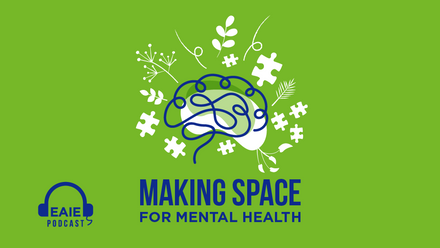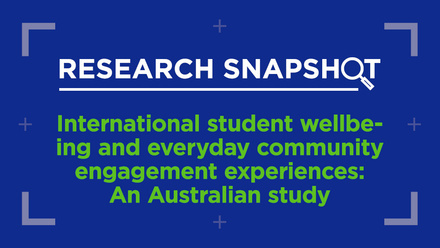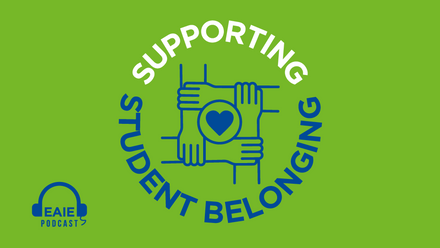How to help students cope with mental health challenges

As most counsellors and student support staff well know, university students are considered a group at risk when it comes to mental health issues. Thankfully, positive psychology offers tools and frameworks for developing student support strategies that foster resilient responses and mental strength, helping students draw from their internal and external resources, to cope in more positive ways with the unique challenges that they face during these testing times.
When COVID-19 hit, universities were forced to close their facilities; deal with travel restrictions and shifting directives regarding visas for international students; support social distancing measures; bear weeks of quarantine; and dramatically transition to online learning as a way to "flatten the curve". These measures, while necessary, had a significant psychological impact on every member of the affected academic communities, let alone struggling students.
In terms of the impact that the pandemic initially had among university students, the first reports came from China, showing increased rates of post-traumatic stress disorder and depression among their student population, indicating that the psychological consequences of COVID-19 could be serious. Later in 2020, a study conducted among student populations of 100+ countries discovered that during the lockdown, most students struggled with concerns about their professional future, academics, and feeling bored, anxious and frustrated.
Developing positive interventions
As the COVID-19 pandemic will likely continue to unfold throughout the year 2021, university students (as much as other university communities) will have to learn how to positively cope and commit to their personal and academic goals in spite of ongoing disruption and uncertainty. This capacity is generally known as ‘psychological resilience’ and is roughly defined as one’s ability to cope with adverse situations and bounce back from them, oftentimes stronger.
Positive psychology stands out not only as the 'science of happiness', but also as the science of the 'positive response'
Given the unpredictability of this pandemic and its aftermath, it is now time for universities to develop student support strategies that move students from ‘surviving’ the effects of the pandemic, to help them successfully bounce back and even learn how to ‘thrive’ during uniquely difficult times, by building awareness of the concept of ‘resilience’ and supporting positive coping behaviours moving forward. It is possible for higher education institutions to promote a culture of resilience through the design and development of interventions aimed at preventing anticipated negative coping. What follows are three key areas to consider when planning and delivering such interventions.
1) Characteristics of planned interventions
There are many kinds of student support interventions, from the more complex, such as developing awareness campaigns, to the simplest ones, such as reaching out to a student via email. In spite of the scope of any measure, when being more intentional about crafting fair and culturally sensitive interventions, the list below offers practitioners a range of points to consider in order to expand their outreach with a truly inclusive and systemic perspective in mind:
• Accessibility: All students should be able to access tools, resources and materials, even if their financial and digital resources are limited.
• Intentional outreach: Interventions must respond to and address the needs of specific groups on campus.
• Culturally informed: Emphasise cultural sensitivity, particularly when addressing international students, students of colour, low-income and first-generation university students.
• Collaborative: Measures should strengthen collaboration with community resources; build relationships with entities that support mental health or develop meaningful links with organisations that have programmes and services that can be transferred into ‘virtual campuses’.
• Research-based: Interventions should gather data concerning students’ coping behaviours in order to build evidence-based planning and design of support systems
• Evolving: Support measures recognise the evolving nature of student needs and develop tracking mechanisms.
• Inclusive and anti-discriminatory: Approaches must challenge discrimination and stigmatisation of specific communities on campus due to COVID-19 (particularly recognising that Asian students are a vulnerable population of suffering hate speech and bullying).
• Cognisant of healthcare ecosystems: Being aware of the accessibility to physical and mental health provision that students have access to, and recognise existing gaps in the system.
2) Topics and content:
Students’ attention can be garnered if practitioners make sure that interventions address the topics and themes that matter to them. Gathering information concerning students’ needs during the pandemic is a key priority, as it is important also to offer new perspectives and strategies on how to cope with these exceptionally challenging times. What follows is an inexhaustive list of topics that provide support and encourage resilient responses:
• Introduction to resilience: Theoretical and practical dimensions of the concept of ‘psychological resilience’ should be presented and competencies such as personal efficacy, community building, usefulness, personal control, agency and continued learning, also supported.
• Effective responses to COVID-19 challenges: Interventions must continue to provide useful guidelines and information on complex challenges such as campus relocation, housing status, ability to travel, visa status (in the case of international students) and government directives.
• Academic responses: Interventions should address workload levels and allowances on grading requirements that contribute to alleviating or reducing stress.
• Screening for distressing psychological states: Measures can use social media networks as means to reach out to the university students and screen for depression/anxiety by administering standardised scales.
• Activate personal resources: Enhancing coping strategies, emotional regulation and boost self-confidence are ultimate goals of any "resilience-building" intervention.
• ‘Mental strength’ skills training: These interventions are aimed at building skills in areas such as positive thinking, anxiety control, visualisation techniques, goal setting and attentional control.
• Sense of purpose and life meaning: Research has shown that having meaning and purpose in life helps cope much more effectively with extreme difficulty. These interventions would touch upon topics such as clarity of personal goals, purpose, vision, ambitions and the ability to visualise the outcome/results of what one is doing.
3) Modalities
The medium, or how the intervention is delivered, also matters tremendously in pandemic times, when social distancing and avoiding groups is required for safety purposes. Many practitioners are aware that students prefer mental health approaches that facilitate self-management and independence, which is characteristic of online support. Whichever modality you may choose for your intervention, consider the following points:
• Participatory and research-informed: Peer-based, community-based, coalition-building and supportive of joint work between researchers and target groups in order to adapt interventional programmes to specific contexts.
• Focus on self-management: Students frequently seek telehealth applications that allow them independence, anonymity and virtual delivery.
• Technological access and provision: Digital web-based platforms, online modules, mobile apps and smart wearable sensors can enable virtual communication with caregivers, which occurs via private PCs, tablets or smartphones anytime and anywhere and only internet access is required.
• Impact of educator’s role: Awareness and effective use of modelling behaviour of the mentor in the development of resilience among students.
The above points can serve as a template when thinking of interventions to shift students’ focus from "what is wrong with me" to "what is right with me and my life" in spite of the existential storm that the COVID-19 pandemic has represented for many students. In this sense, positive psychology stands out, not only as the "science of happiness" (as it is famously touted) but also as the science of the "positive response", putting an emphasis on our capacity to bounce back from distress, find meaning in challenges and regain agency and self-control during the most difficult of times.
As all of us will continue to face challenges that lie ahead, we as practitioners need to move from remedial to resilient interventions with our students. The pandemic goes on, but the time is now.






